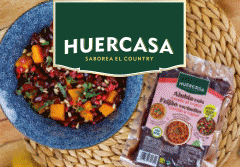The Ramiro Arnedo seed company continues to make steady progress in the search for varieties that combine resistance, ease of management and high profitability for growers. This season, the company is focusing its strategy on several key crops, with a special emphasis on the red California pepper varieties Victoriano, Testudo and Clipeo, all part of the ProRes line, which merges productivity and resistance.
“Victoriano is the earliest of the three, suitable for transplants from late June to July 10. It is followed by Clipeo, ideal for the first half of July, and Testudo, which covers later dates into August. All three feature notable resistance to powdery mildew, spotted wilt and L4, in addition to being vigorous, open and highly productive plants,” García notes.
This focus on resistance also extends to other crops. In aubergine, Serafina “stands out for its vigour, green calyx and flawless appearance, ideal for transplanting throughout August.” In cucumber, the new release is Sebas, a Dutch type with quadruple resistance to yellowing, yellow vein, CGMV and powdery mildew, designed for late-summer sowing.
The company is also introducing innovations in the lamuyo and California segments, with materials such as Domecq (extra early), Jandilla (mid-season), and the yellow Californias Ambarino and Leonado, all bred with reinforced resistance to major diseases.
RELATED NEWS: Spain and Germany maintain their affinity in peppers
Tomato is another priority crop, with the addition of a beef, a large pear-shaped and a Daniela type (Surprised), all resistant to ToBRFV. In melon, the portfolio includes classics such as Hawaii, Nassau and Bahamas, all faithful to the company’s signature yellow standard.
“One of the main traits our geneticists look for is plant robustness. We want varieties that appeal to a wide range of growers and don’t require special care,” the technician emphasises.
The philosophy is clear: to offer productive, hardy and accessible plants for all types of farmers, capable of meeting today’s climatic challenges without complex management. At Ramiro Arnedo, resistance is not at odds with quality—it’s the foundation upon which the future of its varieties is built.




















